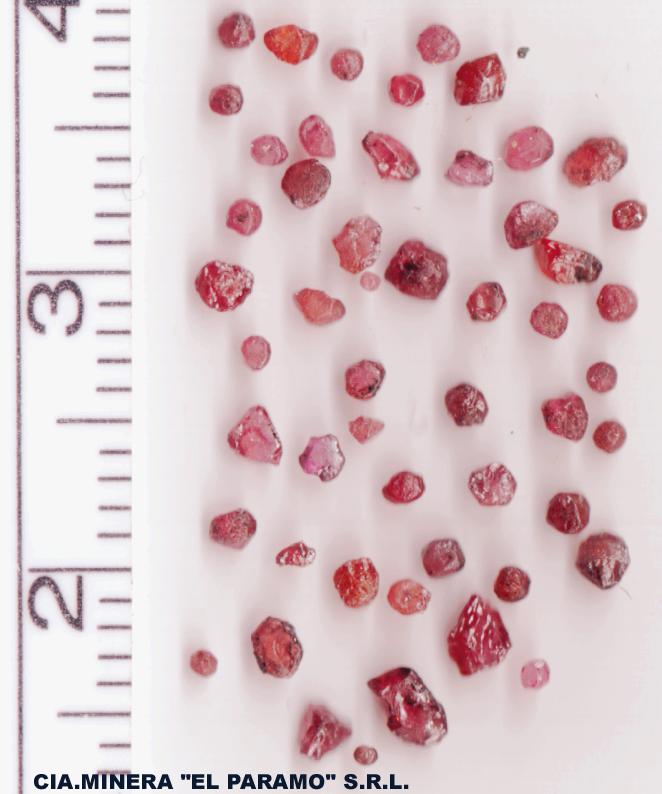![]()

![]()
|
Una de las áreas, entre otras, que se destaca por la mayor presencia de importante minerales precioso y pesados que resultan económicamente explotables, es el Área CARMEN SYLVA, Mina "DELIA". Actualmente una empresa minera local (Cía. Minera El Páramo SRL) posee los derechos mineros del área y se encuentra desarrollando un proyecto de minerales pesados y preciosos. Este sector cuenta con una evaluación preliminar del recurso (CNIE) con las siguientes estimaciones: Estimación de Volumen y Tonelaje del Sedimento:
Contenidos estimados en Oro: Mineralógicamente, se ha comprobado también la presencia de oro, en la fracción arena fina, en forma de laminillas (0,25 a 0,125 mm) COMPARATIVO YACIMIENTO DE MINERALES PESADOS - BAHÍA SAN BLAS (Pcia. Bs.As.) vs ÁREA CARMEN SYLVA (TDF) El cuadro que se destaca más abajo es una síntesis comparativa de los tonelajes de minerales pesados calculados para éste sector de playa del litoral Atlántico de la Tierra del Fuego con respecto a las reservas del Yacimiento de la Bahía de San Blas en el sur de la Provincia de Buenos Aires (ANGELELLI V. y E. CHAAR, CNEA 122/64 y CNEA 210/67), éste yacimiento constituye la reserva más importante de titanio y circonio de nuestro país. De tal comparación puede destacarse que los tonelajes de minerales pesados totales en la Bahía San Blas son algo mayores (aproximadamente 11,8%), pero sólo considerando el sector "A" evaluado de playa actual del área Carmen Sylva, puesto que las reservas de minerales no magnéticos de San Blas (incluyendo los médanos) representan sólo 2/5 de las reservas estimadas para el Área Carmen Sylva y/o Mina La Cristel de la Tierra del Fuego, Argentina.
Asimismo surge de la evaluación de todos los parámetros y características del sector la necesidad de profundizar los estudios geomorfológicos y de la geología del cuartario de estos depósitos, mediante las aplicaciones geofísicas complementarias (gravimetría, magnetometría, etc.) con el objeto de ampliar estas reservas, especialmente en la Zona III (Playa frontal borde intercotidal) ya que, presenta características granométricas más homogéneas, lo cual facilitaría una eventual explotación de minerales pesados como la que sé prevé en una segunda etapa del proyecto. CONTENIDO METÁLICO DEL YACIMIENTO Los minerales identificados de interés económico son:
|
One of the areas, among others, which is outstanding for a major presence of important heavy minerals, which are able to be worked economically, is that of Carmen Sylva, with the deposit called Mina DELIA. At the present time a local firm, Cía Minera El Páramo SRL, owns the mineral rights of the area and is developing a scheme for the extraction of heavy minerals. A preliminary evaluation of resources (CNIE) results in the following estimates: Estimates of Volumes and Tonnages of Sediment Volume of sediment 8, 398, 793 m3 Tonnage of sediment 14,555,141 tonnes Estimate of Heavy Minerals Reserves Type Non-magnetic 1, 559, 925 tonnes Magnetic 108, 855 tonnes Total 1, 668, 780 tonnes Of these minerals, about 93.5% comprise non–magnetic heavy minerals, which makes the deposit a major economic attraction, as this fraction allows the concentration of those of greatest economic interest, such as:– ilmenite, ilmenorutile, zircon, all natural sources of titanium and zirconium. Estimated gold content The presence of gold has been established mineralogically in the fine sand fraction in the form of specks (0.25 to 0.125 mm). Comparison of the Deposits of Heavy Minerals at Bahía San Blas (Province of Buenos Aires) and the Carmen Sylva area of Tierra del Fuego The table below is a comparative synthesis of the tonnages of heavy minerals calculated for this area of the beach on the Atlantic coast of Tierra del Fuego compared with the reserves of the deposits in Bahía San Blas in the south of the Province of Buenos Aires (ANGELELLI V. and E. CHAAR, CNEA 122/64 and CNEA 210/67). This deposit forms the most important reserve of titanium and zirconium of our country. Such comparison may show that the total tonnages of heavy minerals in Bahía San Blas are somewhat bigger (approximately 11.8%), but considering only Sector A, the beach of the Carmen Sylva area, given that the non-magnetic mineral reserves in San Blas (including the sand banks / dunes) represent only two fifths of the estimated reserves of the Carmen Sylvia area and / or the Mina La Cristel in Argentine Tierra del Fuego. Comparative Table Bahía San Blas Carmen Sylva Area: 45 Km. 44 Km. Sediment: 21, 000, 000 tonnes 14,555, 141 tonnes Totals of 1, 951, 267 tonnes 1, 559, 925 tonnes Heavy Minerals Magnetic Minerals: 1, 300, 845 tonnes 108, 855 tonnes Non-Magnetic Minerals: 650, 422 tonnes 1, 668, 780 tonnes Moreover, other favourable elements for priority consideration in this area are related to the mineralogical characteristics of this accumulation of heavy minerals. Likewise arise form the evaluation of all the parameters and characteristics of the area the need to deepen the geomorphological studies and of the geology of the cuartario of these deposits by means of complementary geophysical applications (gravity meter magnetometer, etc) with the aim of extending these reserves especially in Zone III (the fronting beach in the inter-tidal zone) which presents a more uniform particle size distribution, which will facilitate the eventual working of heavy minerals such as is envisaged in a second stage of the project. Metallic Contents of the Deposit The minerals of economic interest which have been identified are:–
|
![]()
![]()
Atención!! , para una mayor Información sobre minería contactarse con Delia Velazquez:
For more information about mining contact Delia Velazquez
![]()
![]() VOLVER
AL MENU DE GEOLOGIA Y MINERIA
VOLVER
AL MENU DE GEOLOGIA Y MINERIA
(RETURN TO THE GEOLOGY AND MINING MENU)
(RETURN TO THE CONTENTS MENU)